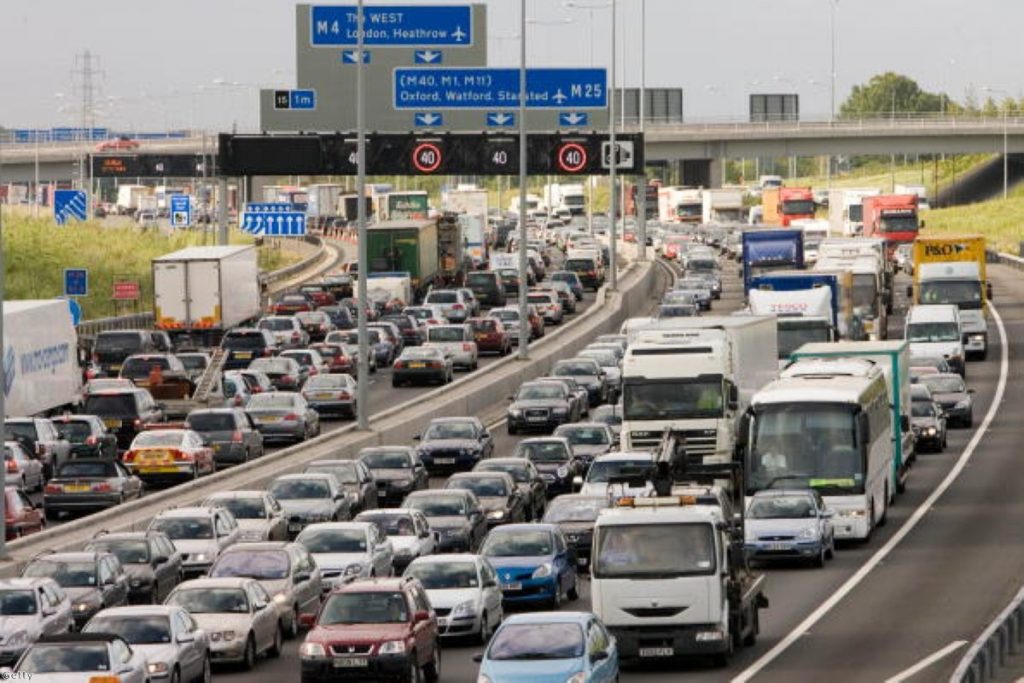George Osborne’s £15 billion road to nowhere
The government believes that tarmac is popular. So popular in fact that George Osborne now plans to spend £15 billion of our money on it by the end of the decade.
Both the Tories and the Lib Dems are desperate today to take credit for Osborne's new spending spree, with Labour's only criticism being that he should have lavished even more on the black stuff even sooner.
"If ministers were as good at upgrading roads as they are at making announcements about upgrading roads, life would be considerably easier for Britain's hard-pressed motorists," Labour's Michael Dugher said this morning.
After all what's £15 billion on new roads, when the government could be spending £20 billion or £30 billion instead?


Yet amid the frenzy, nobody seems to have asked the obvious question. Rather than ask whether even more money should be spent on our roads, shouldn't we all be asking whether it should be spent at all?
England's roads are getting a £15bn upgrade. Where do you think the money needs to be spent? http://t.co/VZWM0X3VtV pic.twitter.com/m2yA7ys32D
— Sky News (@SkyNews) December 1, 2014
Because the truth is that road-building remains one of the worst investments any government can make.
Widening roads does create jobs in the short term. It would be pretty difficult not to create at least some jobs with £15 billion to hand. But these jobs tend to be low-skilled and transitory. Once the roads are widened and the construction companies move on, those jobs move on as well.
Widening a road may also help the local economy in the short term. But all the evidence from previous road-widening schemes shows that congestion quickly returns to levels seen before billions of pounds were spent on them.
Don't believe it? Well neither did the Major government in the 1990s.
Faced with opposition to their own road-building plans, Major commissioned a report seeking to disprove the theory beloved of environmentalists, that new roads simply induced new traffic.
Instead they found extensive evidence that "induced traffic" can and does occur when roads are built or widened. They found that when trunk roads are already running beyond capacity, widening them simply exacerbates the original problem.
One of the case studies they looked at was the Blackwall Tunnel under the River Thames in East London. There was originally just one tunnel at Blackwall built in the previous century. This tunnel had failed to cope with the huge amount of vehicles trying to use it, so the obvious thing to do was to just build another one. Politicians at the time figured that creating twice as much road space would create half as much congestion.
Except when the tunnel opened in 1967 the number of vehicles using the crossing at peak times more than doubled within a year. Twice the road space had induced twice the amount of traffic. Rather than relieve congestion, the new tunnel had simply spread it even further across the local area.

More recently the last Labour government tried to tackle congestion on the M6 motorway by allowing the construction of a new toll road.
The 27-mile privately operated motorway was designed to relieve congestion on the M6 and boost the local economy. Yet ten years later and congestion on the M6 is now even worse than it was before the road first opened. The project has been a costly and environmentally damaging failure.
Yet rather than learn from these historic mistakes, our politicians seem determined to repeat them. Both the coalition and the Labour party back plans to build yet another tunnel at Blackwall while £15 billion of public money is to be poured into digging even more new tunnels and motorway lanes in other parts of the country.
And all of this is being done without any of the three main parties questioning whether it is a good use of our money.
Interviews before dawn this morning @EH_Stonehenge to talk about the Coalition's £15 billion investment in roads. pic.twitter.com/GTCmMHbWGr
— Nick Clegg (@nick_clegg) December 1, 2014
In these times of austerity, we're constantly told that there isn't enough money to pay hospital staff a decent wage or to build enough schools to educate our kids, but when it comes to laying hundreds of miles of new tarmac, money appears to be no object.
The absurdity of this situation becomes even more clear when you dig into today's proposals. Amid the plans for 84 new road schemes are plans to spend £300 million on an "environmental fund to mitigate carbon emission (sic) and reduce the number of people affected by serious noise."
So billions of pounds are to be spent increasing emissions and increasing the number of people suffering from noise pollution, only for a few hundred million to be spent making that situation slightly less worse than it might otherwise have been. It's like a drunk driver crashing his car into a house, only to chuck a few quid through the hole he's made in the brickwork.
Of course nobody denies that some money should be spent on the road network. There are thousands of miles of roads across the country which are in terrible need of maintenance and repair. But simply pouring billions upon billions of pounds on endlessly widening our motorways has proven again and again to be a monumental waste of taxpayers' money.
With budgets set to be painfully tight over the next decade, every pound of public spending should be tested on whether it actually solves a problem rather than creates one. Today's announcement hopelessly fails that test.









